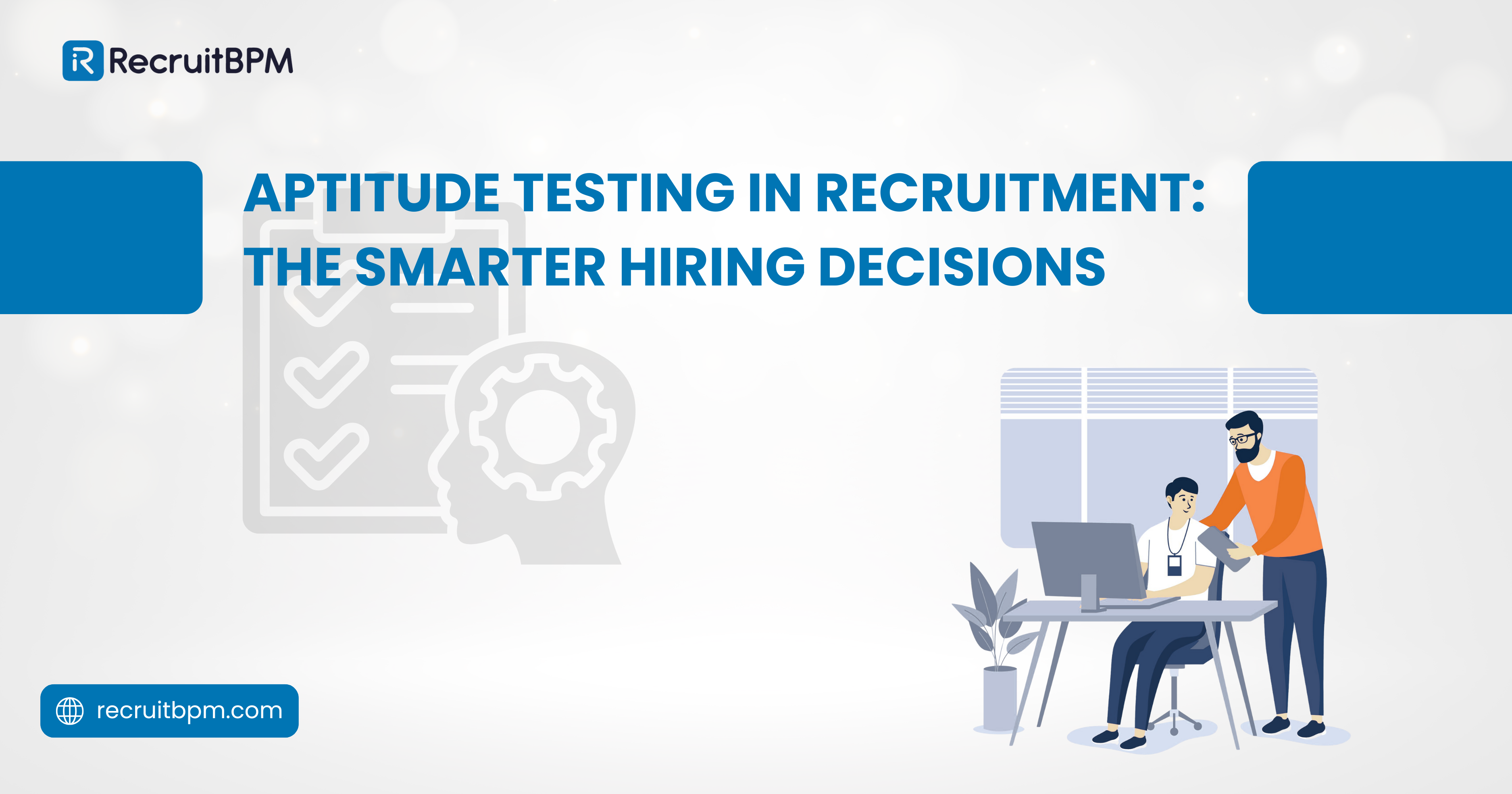Resume screening reveals credentials and experience, but it can’t predict whether candidates possess the cognitive abilities necessary for success in demanding roles. Recruitment agencies face constant pressure to move beyond surface-level qualifications and identify candidates with genuine potential.
Aptitude testing transforms hiring from guesswork into science. These assessments measure cognitive capabilities that determine job performance, providing objective data that complements traditional evaluation methods. Understanding how to implement aptitude testing strategically separates recruitment agencies that consistently deliver quality placements from those relying on intuition alone.
What is Aptitude Testing?
Aptitude testing refers to standardized assessments designed to measure cognitive skills, problem-solving abilities, and specific competencies required in professional environments. These psychometric tools evaluate a candidate’s potential to learn, think critically, and handle the intellectual demands of particular roles rather than assessing existing knowledge or experience.
The tests assess various cognitive dimensions, including numerical reasoning, verbal reasoning, logical thinking, abstract reasoning, spatial awareness, and technical aptitude. Unlike skills tests that measure current proficiency in specific tasks, aptitude tests predict future performance by evaluating underlying mental capabilities.
Common aptitude test formats include numerical reasoning assessments that measure the ability to work with data and perform calculations, verbal reasoning tests that evaluate comprehension and communication capabilities, logical reasoning assessments that gauge pattern recognition and deductive thinking, and abstract reasoning tests that measure the ability to identify relationships between concepts.
Aptitude tests in recruitment assess cognitive skills and competencies, including numerical reasoning, verbal reasoning, logical thinking, technical aptitude, and problem-solving. These standardized measurements provide objective benchmarks that complement subjective interview impressions.
Employers use aptitude tests to assess cognitive ability, problem-solving skills, and decision-making skills as suitable for a role. The assessments help identify candidates who can adapt to complex challenges, learn new systems quickly, and make sound judgments under pressure—qualities difficult to evaluate through resume review alone.
Most aptitude tests are timed, creating pressure that simulates real workplace demands. The combination of difficulty and time constraints reveals how candidates perform when facing tight deadlines and competing priorities.
Why Aptitude Testing Matters for Recruitment Agencies?
The recruitment landscape increasingly demands objective assessment methods that reduce bias, predict performance accurately, and streamline candidate evaluation. Aptitude testing addresses these needs while delivering measurable business value.
Quality of hire improvements justify implementation. Data shows that 91% of employers who use multi-measure testing make quality hires every time, compared to 67% for employers who don’t use skills tests. This dramatic difference demonstrates aptitude testing’s impact on placement success rates. Better placements mean satisfied clients, reduced replacement costs, and a stronger agency reputation.
Objective evaluation reduces bias. Aptitude tests provide a standardized and unbiased way to assess candidates. When evaluations rely solely on resume review and interviews, unconscious biases influence decisions. Standardized testing creates level playing fields where candidates compete based on demonstrated abilities rather than background characteristics or interviewer rapport.
Early screening efficiency increases dramatically. By utilizing these tests early in the selection process, recruiters can assess key competencies like numerical reasoning, logical reasoning, problem-solving, and other cognitive abilities. Front-loading objective assessments filters candidates before expensive interview stages, focusing human evaluation time on individuals most likely to succeed.
Rejection rates reveal assessment value. Research has revealed that 60-80% of candidates are rejected based on their aptitude test results. While this high rejection rate might seem concerning, it actually demonstrates testing effectiveness at identifying candidates who lack the necessary cognitive capabilities. Without aptitude testing, these mismatched candidates would consume interview time and potentially receive offers despite qualification gaps.
Industry-specific benefits drive adoption. These tests are particularly beneficial for industries such as finance, engineering, and IT, where cognitive abilities are critical. Sectors requiring complex problem-solving, data analysis, or technical reasoning gain especially strong value from aptitude assessments.
Cost reduction addresses recruitment expenses. By accurately assessing a candidate’s skills and personality, aptitude tests reduce the risk of recruitment errors, avoiding additional costs associated with replacement and training. Bad hires create cascading expenses—lost productivity, team disruption, replacement recruiting costs, and onboarding investments. Aptitude testing reduces these failures by identifying poor fits before placement.
Predictive validity exceeds traditional methods. Cognitive ability tests consistently demonstrate a stronger correlation with job performance than experience, education, or unstructured interviews. The predictive power makes aptitude testing one of the most reliable indicators of future success.
Candidate assessment becomes scalable. Aptitude tests evaluate hundreds of candidates simultaneously without proportional increases in recruiter workload. This scalability proves essential when popular positions attract overwhelming application volumes.
How to Use Aptitude Testing Effectively?
Implementing aptitude testing successfully requires strategic planning, appropriate test selection, and integration with existing recruitment processes rather than wholesale replacement of proven methods.
Select tests aligned with role requirements. Different positions demand different cognitive capabilities. Accounting roles require strong numerical reasoning; marketing positions need verbal comprehension; engineering roles demand logical and spatial reasoning. Match test types to actual job demands rather than administering generic assessments. Analyze successful employee profiles to identify which cognitive abilities correlate with performance in specific roles.
Implement testing early in recruitment funnels. Use aptitude assessments after initial resume screening but before extensive interviews. This positioning filters candidates efficiently while avoiding wasted effort on clearly unqualified applicants who wouldn’t pass screening anyway. Early testing maximizes efficiency gains while maintaining candidate experience quality.
Combine aptitude testing with multiple assessment methods. Aptitude tests measure cognitive ability, but they don’t evaluate motivation, cultural fit, communication skills, or domain expertise. Integrate testing within comprehensive evaluation frameworks that include interviews, skills assessments, reference checks, and behavioral evaluations. Multi-measure approaches deliver the strongest predictive accuracy.
Establish appropriate scoring thresholds. Set minimum scores that balance filtering effectiveness against talent pool reduction. Overly stringent cutoffs eliminate qualified candidates unnecessarily; lenient thresholds fail to provide meaningful filtering. Analyze historical performance data to identify score ranges that correlate with successful placements.
Communicate expectations clearly to candidates. Inform applicants that aptitude testing forms part of your evaluation process. Explain what abilities tests measure, how results influence decisions, and approximately how long assessments take. Transparency builds trust and ensures candidates arrive prepared mentally for timed evaluations.
Provide reasonable accommodations when required. Legal obligations and ethical considerations demand accommodations for candidates with disabilities or other special circumstances. Ensure your testing process complies with relevant employment laws while maintaining assessment validity.
Monitor adverse impact continuously. Track whether aptitude testing disproportionately screens out protected demographic groups. Persistent disparate impact may indicate test bias requiring correction through alternative assessments or adjusted scoring methods. Regular analysis ensures testing supports rather than undermines diversity goals.
Use validated, professionally developed tests. Invest in assessments backed by psychometric research demonstrating reliability and validity. Poorly designed tests produce meaningless results that don’t predict performance. Professional test providers offer scientifically validated instruments with established norms and legal defensibility.
Provide candidate feedback when appropriate. Consider sharing general test results with candidates, especially those who performed well but weren’t selected for other reasons. This practice builds goodwill and keeps strong candidates engaged with your agency for future opportunities.
Track testing ROI through placement outcomes. Monitor whether candidates who score highly on aptitude tests become successful placements. Calculate how testing affects time-to-fill, quality-of-hire, and replacement rates. Data-driven evaluation justifies continued investment and identifies improvement opportunities.
Common Challenges with Aptitude Testing
Despite significant benefits, aptitude testing introduces challenges that recruitment agencies must navigate carefully to maximize value while minimizing risks.
Candidate anxiety affects performance. Timed tests create stress that doesn’t reflect normal working conditions. Some talented candidates perform poorly under test pressure despite possessing the necessary abilities. This anxiety-driven underperformance can screen out qualified individuals, particularly those with test-taking difficulties or those unfamiliar with assessment formats.
Practice effects create inequity. Candidates who invest time practicing aptitude tests significantly outperform those encountering assessments cold. This preparation advantage may favor candidates with more time, resources, or awareness of testing’s importance, rather than measuring pure cognitive ability. The result can inadvertently screen out qualified candidates from disadvantaged backgrounds.
Cultural and educational bias persists. Despite claims of objectivity, many aptitude tests contain subtle cultural assumptions or require educational familiarity that disadvantages certain demographic groups. Verbal reasoning tests may use idioms or references unfamiliar to non-native speakers. Numerical tests may assume specific mathematical training patterns.
Overreliance on testing misses critical factors. Aptitude scores measure cognitive ability but can’t evaluate motivation, work ethic, creativity, interpersonal skills, leadership potential, or cultural fit. Agencies that weight aptitude testing too heavily risk selecting intelligent candidates who lack other essential qualities. Balance remains critical.
Test validity varies by role complexity. Aptitude testing predicts performance most accurately for cognitively demanding roles. For positions requiring primarily physical skills, interpersonal abilities, or creativity, aptitude tests offer less predictive value. One-size-fits-all testing approaches fail when role requirements vary significantly.
Implementation costs create barriers. Quality aptitude testing platforms require licensing fees, integration expenses, and ongoing administration costs. Smaller recruitment agencies may struggle to justify investments, especially when placing candidates in roles where cognitive ability matters less than other factors.
Legal compliance creates complexity. Employment law governing pre-employment testing varies by jurisdiction. Agencies must ensure their testing practices comply with anti-discrimination laws, data privacy regulations, and accommodation requirements. Non-compliance creates legal liability that outweighs testing benefits.
Candidate experience concerns arise. Additional assessment steps lengthen recruitment processes and increase candidate burden. Top candidates with multiple opportunities may withdraw rather than complete extensive testing. Balancing thorough evaluation against competitive speed-to-offer challenges in recruitment agencies.
Score interpretation requires expertise. Raw test scores mean little without proper context and interpretation. Understanding what scores predict, how they compare to relevant norms, and when results justify rejection requires training that many recruiters lack. Misinterpretation leads to poor hiring decisions despite having objective data.Technology requirements limit accessibility. Online aptitude testing assumes candidates have reliable internet access, suitable devices, and technical proficiency. These requirements may disadvantage qualified candidates facing digital divides, inadvertently screening out talent from underserved communities.

















